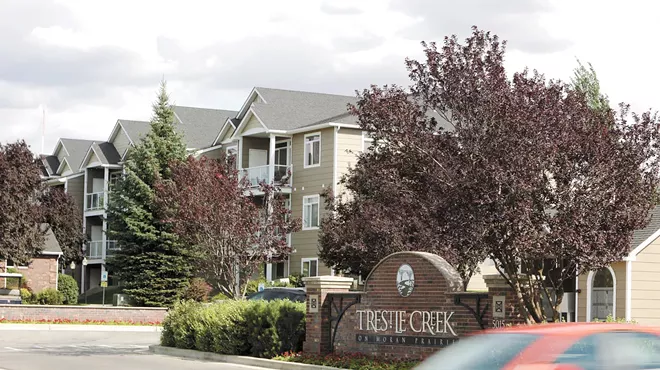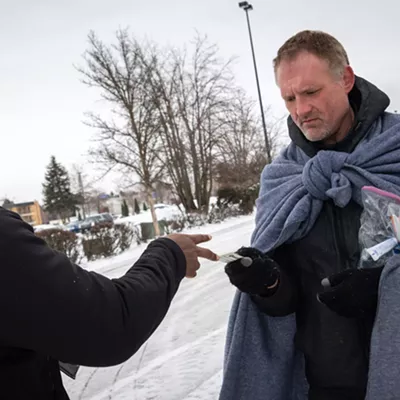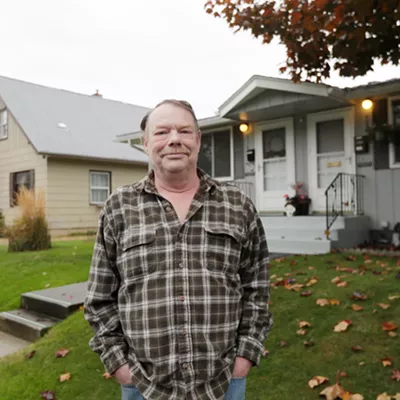
On July 1, Melody Deatherage arrived home after work to find a notice of rent increase on her door.
She'd been expecting a bump in rent, but this was far beyond what she'd imagined: an increase of over $500 a month, effective Sept. 1.
And if Deatherage, 65, refused to sign a lease under those terms, then Hilby Station Apartments would increase her rent again to $2,350 — double what she's currently paying.
Deatherage, who works in human resources for a nonprofit agency, says it left her without options. She can't move, since the vacancy rate in Spokane is so low. But paying an extra $500 alone is a significant change.
"I liked my setup, my situation, my location. To be forced into potentially having to move or having to seek other kinds of housing solutions, it's this huge disruption and stress imposed on my life," she says.
Other renters in Spokane are seeing similar increases since Washington Gov. Jay Inslee lifted the eviction moratorium on June 30 that prevented it. Spokane has seen a 29 percent increase in median rent in the last year — the second-fastest increase in the country, according to a recent report by Apartment List.
Morgan Trau, a KREM TV reporter, said on Twitter that her rent at the Trestle Creek Apartments was being raised by $600, plus another $600 if she didn't sign a new lease. Another Trestle Creek tenant, who requested anonymity for this article, tells the Inlander she is having her own rent increased by 50 percent, plus more if she doesn't sign a lease.
"It seems to me that either I pay this increase or I will be homeless," the tenant says.
It's a crisis likely leading to increased homelessness, and experts say it's driven by a lack of housing supply and the unintended consequences of the eviction moratorium.
But right now, tenants and tenant advocates feel powerless to prevent it.
"The increases I'm seeing are perfectly legal," says Terri Anderson, Spokane director for the Tenants Union of Washington State. "This can't continue. But there's nothing stopping it."
"This can't continue.
But there's nothing stopping it."
WHAT HAPPENED?
Tenants thought things were getting bad in 2019.At the time, rents had gone up by 45 percent since 2014, and the vacancy rate was only 1.8 percent, according to the Washington Center for Real Estate Research at the University of Washington.
The pandemic — and the accompanying eviction moratorium — may have kept people from being evicted. But in other ways, the pandemic contributed to the soaring rent that tenants are facing now that the moratorium has lifted.
"You've got a perfect storm for a crisis," says James Young, director for the Washington Center for Real Estate Research.
For one, Young says the pandemic, work-from-home opportunities and early retirements may have accelerated movement to Spokane from more expensive areas like Seattle. He thinks that, combined with a lack of housing for new home buyers, has made it difficult for renters to transition into home buying.
"There's no supply, and they're getting outgunned," Young says. "So that means they're stuck in the rental market for longer. It increases the demand of the rental market because the units aren't turning over."
The eviction moratorium was another force keeping renters in their units. And while some new multifamily units are being built, the supply has not kept up with the demand.
The result? A vacancy rate this spring in Spokane of 0.5 percent.
That's one part of the equation. The other is that landlords say the eviction moratorium resulted in losses that they need to recover.
"Housing providers have had to shoulder the burden of the pandemic for the last 16 months," says Brett Waller, director for government affairs for the Washington Multifamily Housing Association.
They've still had to make mortgage payments even if renters can't pay. Property taxes, insurance and utility costs have gone up, he says, and rental assistance has been slow to roll out in many cases. Even if one out of 10 renters isn't paying rent, it can have a profound impact on a landlord, considering most of rent goes toward operating costs, Waller says.
Still, the rent increases of 50 to 100 percent aren't representative of what's happening with properties throughout the area, says Steve Corker, director for governmental affairs for the Landlord Association of the Inland Northwest. With some exceptions, he says most landlords aren't raising rent by more than $100 — which can still be a significant burden for renters.
"That is not common within our membership," Corker says. "For the renters who have been meeting the obligation, the last thing you want to do is slap them in the face."
The thing is, the company controlling both Hilby Station and Trestle Creek, where tenants have seen $600 increases, is Greystar, a company with massive apartment complexes all over the area and the entire globe. If they're raising rent that much, that can affect thousands of tenants. (Greystar did not respond to a message seeking comment for this article.)
Anderson, the tenant union director, suspects that if property managers are doubling the price for renters who won't sign a lease, it may be a way around a new state law passed this year that requires a "just cause" to evict renters on month-to-month tenancy. A rental agreement on a fixed 6-to-12-month term requires 60 days written notice for eviction before the term ends, but does not require a just cause to terminate.
As for the initial rent spike, Anderson says it's simple.
"I suppose they'll charge what they think they can get," she says.
WHAT HAPPENS NOW?
Jared Rountree, a phlebotomy supervisor for Providence Medical Group Laboratory, is worried he's going to lose his employees. One of them got a rent increase of about $200. Another, a single mom, got a rent increase of $500. And a third got notice of a $1,000 increase.He's tried to find assistance for them, but they can't afford to pay that much and can't find another place in Spokane to move. If they leave, he knows it will be difficult to hire replacements.
"If you start pulling really qualified people from the city, your medical field — how you get taken care of — is going to change," Rountree says.
Anderson says stories like this illuminate the seriousness of the crisis.
"Normally we get calls from tenants that are already rent burdened, who may be disabled or low-income," she says. "Now we are getting people who make $15-$20 an hour with livable wages, but these rent increases would put them into poverty. And if they don't have a place to go, they will be unhoused."
Short of rent control, however, Anderson says she doesn't have many answers that would help them.
Patrick Jones, the executive director at the Institute of Public Policy and Economic Analysis at Eastern Washington University, says wages right now don't come close to keeping up with rent increases — especially if there are increases of 30 percent.
These rent spikes, however, shouldn't repeat themselves to this magnitude, Jones says. Permitting activity for multifamily housing right now in Spokane is "strong," he says, and he anticipates that continuing.
"If prices are high, then that's going to invite other suppliers into the market, and over time, those price increases will abate," Jones says. "They won't drop to zero, but they will definitely slow down."
Young, from UW, says increasing housing supply is critical, but he stresses that there should be a variety of ownership options for those wanting to move out of the rental market and into ownership. That can mean building more condominium developments, for example.
If not, he argues prices in the entire rental market will rise. He describes it as a "ladder" — when a key segment of the market has a bottleneck, it hurts those down the ladder. At that point, building more low-income apartments, while necessary in the short term, becomes a game of "whack-a-mole."
Waller, from the Washington Multifamily Housing Association, says that in order to create a better variety of housing in Spokane, the city needs to remove single-family zoning. It's something housing advocates in Spokane have been calling for and a few City Council members may support.
"Single-family zoning is an exclusionary zoning policy that prevents the opportunity to create one duplex and one triplex in a neighborhood," Waller says. "Removing it doesn't mean they're going to put a 25-story tower down the street."
These solutions working long term is the best case scenario, however. In the coming months, it's likely that renters like Deatherage will continue seeing rent increases, forcing them to scramble for ways to pay it or find a new place.
"You look around, and there's nothing really to be had," Deatherage says. "I work a full-time job. I don't really have the capacity to make this my job — looking for affordable housing." ♦























